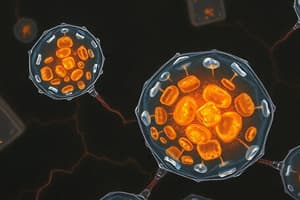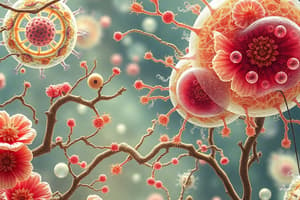Podcast
Questions and Answers
Where are adult stem cells primarily found?
Where are adult stem cells primarily found?
- Lungs and liver
- Brain and spinal cord
- Heart and kidneys
- Bone marrow and gonads (correct)
What distinguishes stem cells from progenitor cells?
What distinguishes stem cells from progenitor cells?
- Progenitor cells can proliferate indefinitely, while stem cells cannot
- Stem cells are usually committed to differentiating into one cell type, while progenitor cells are pluripotent
- Stem cells can divide indefinitely, while progenitor cells cannot (correct)
- Progenitor cells can differentiate into various cell types, while stem cells cannot
What is the developmental stage when roughly 50–150 cells make up the inner cell mass in mammals?
What is the developmental stage when roughly 50–150 cells make up the inner cell mass in mammals?
- Blastocyst stage (correct)
- Fetal stage
- Gastrulation stage
- Embryonic stage
What do embryonic stem cells become when isolated and cultured in vitro?
What do embryonic stem cells become when isolated and cultured in vitro?
What do adult stem cells differentiate into?
What do adult stem cells differentiate into?
What are the main functions of a stem in a vascular plant?
What are the main functions of a stem in a vascular plant?
What is the main purpose of the nodes on a stem?
What is the main purpose of the nodes on a stem?
What is the term used to describe fresh plant growth including both stems and other structures like leaves or flowers?
What is the term used to describe fresh plant growth including both stems and other structures like leaves or flowers?
Where are stems usually located in most plants?
Where are stems usually located in most plants?
What is the normal lifespan of plant cells in stems?
What is the normal lifespan of plant cells in stems?
Flashcards are hidden until you start studying
Study Notes
Stem Cells and Their Properties
- Adult stem cells are primarily found in tissues such as bone marrow, adipose tissue, and certain organs like the liver.
- Stem cells are undifferentiated cells capable of self-renewal and differentiation, whereas progenitor cells are more specialized and have a limited capacity for self-renewal.
Developmental Stages in Mammals
- The inner cell mass in mammals consists of approximately 50–150 cells at the blastocyst stage of development.
Embryonic Stem Cells
- When embryonic stem cells are isolated and cultured in vitro, they can differentiate into various cell types, allowing for potential applications in regenerative medicine.
Differentiation of Adult Stem Cells
- Adult stem cells can differentiate into specialized cell types corresponding to the tissue in which they reside, such as muscle, nerve, or blood cells.
Plant Stems and Their Functions
- Stems in vascular plants serve several main functions, including supporting leaves and flowers, transporting nutrients and water between roots and leaves, and storing energy.
Nodes on Stems
- Nodes on a stem are crucial as they are the points from which leaves and branches emerge, playing a critical role in plant growth and structure.
Plant Growth Terminology
- The term used to describe fresh plant growth, which includes stems alongside leaves and flowers, is "shoot growth."
Location and Lifespan of Plant Stems
- Stems are typically located above the ground, serving as the main structural framework of the plant.
- The normal lifespan of plant cells in stems can vary widely but generally allows for growth and regeneration throughout the plant's life cycle.
Studying That Suits You
Use AI to generate personalized quizzes and flashcards to suit your learning preferences.




